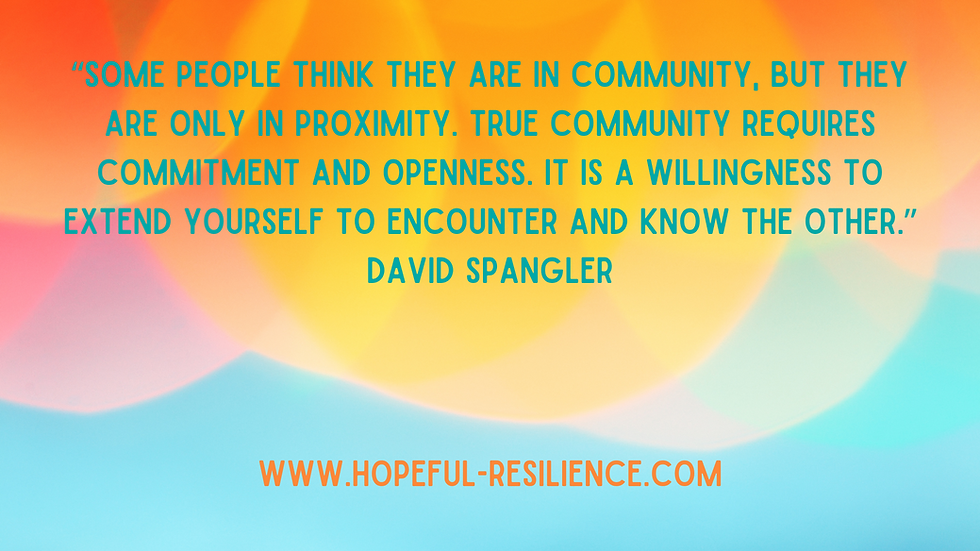March 10 – The Journey of Respect
- Anna Klinman
- Mar 10
- 4 min read
“Even if you cannot change all the people around you, you can change the people you choose to be around. Life is too short to waste your time on people who don’t respect, appreciate, and value you. Spend your life with people who make you smile, laugh, and feel loved.” Roy T. Bennett

Is respect simply holding doors open and saying "please" and "thank you"? While those are important aspects, respect goes much deeper. It's a journey with distinct stages, each one building upon the last, ultimately leading to a more fulfilling existence for ourselves and the world around us.
As Alexandra Hudson states in her book, The Soul of Civility, "The disposition of universal respect for our fellow human beings helps us act in ways that enable us to survive and thrive." But this journey begins inward:
Stage 1: Respect for Yourself
This is the foundation upon which all other forms of respect are built. It's about recognizing your own worth and dignity, understanding your strengths and weaknesses, and treating yourself with kindness and compassion. When you respect yourself, you make conscious choices that align with your values and set boundaries to protect your well-being. This empowers you to live authentically and pursue a life of meaning and purpose.
"I've come to believe that the quality of our lives and the health of our society depends, to a large degree on how well we treat each other in the minute interactions of daily life," David Brooks emphasizes in How to Know a Person. And this "well-treating" starts with ourselves.
Stage 2: Respect for Others
Once rooted in self-respect, we can begin to cultivate respect for others. This involves recognizing the intrinsic value and dignity inherent in every individual, regardless of their background, beliefs, or differences. It encompasses active listening to understand their perspectives, fostering compassion for their struggles, and treating them with courtesy and consideration.
However, respect doesn't mean blind agreement. As Hudson explains, "Civility properly understood is not the problem causing our deep divides. It is in fact an essential part of solving our painful social and cultural fractures." Respectful dialogue, even in the face of disagreement, allows for genuine understanding and paves the way for constructive solutions.
Stage 3: Respect for Community
The culmination of the journey is cultivating respect for the greater community – the people we share our lives with, locally and globally. This stage involves acknowledging the interconnectedness of humanity and recognizing our shared responsibility for the well-being of all. It translates into actively participating in building a more just and equitable society where everyone feels valued and respected.
“You cannot give out one frequency, that of disrespect, and expect respect to flow toward you. Neither can you hold on to your biases, prejudices, and negative thinking toward something, and expect that something positive will return to you.” Stephen Richards

"Great human rights advocates in America's past, and in world history more generally, illuminate a path to a more just and civil future," Hudson reminds us. By embracing this wider concept of respect, we contribute to a world where everyone can flourish.
Activity: Be Kind to Machines
Hudson turns the whole idea of respect on its head with the following idea:
“Only people, not machines, not gadgets, inherently deserve respect. People have dignity and are endowed with intrinsic moral worth, but being kind and courteous to artificial intelligence, such as Alexa, Siri, or Google Home, can help us cultivate habits of civility that can transfer over to our interactions with people.”
This reminds me of a printer that used to say “thank you” when you loaded it with ink or paper. I’d always find myself saying “you’re welcome” and laughing to myself because I was talking to a machine. So instead of yelling at Alexa or teasing Siri, let’s show them a little respect and see if that changes our interactions with the humans in our lives!
In today's increasingly digital world, it's easy to lose sight of what makes us human. The constant bombardment of screens and social media can distract us from cultivating essential qualities like kindness, empathy, and resilience.
My book, Nurturing Hopeful Resilience, guides parents and caregivers through the challenges of raising children in a technology-driven age. It explores the importance of instilling strong values in children from a young age to help them develop into compassionate, responsible, and fulfilled individuals.
Through a series of practical exercises and insightful reflections, this book delves into fourteen core values: curiosity, awareness, kindness, learning, self-awareness, fairness, playfulness, compassion, service, belonging, trustworthiness, authenticity, community, and responsibility. Understanding and nurturing these values can empower our children to thrive in a complex and ever-changing world.
This book offers a roadmap for raising children who are academically successful, emotionally intelligent, socially adept, and morally grounded. It encourages readers to prioritize human connection, empathy, and compassion over material possessions and fleeting digital distractions. By embracing the power of values, we can create a brighter future for ourselves and generations to come.
%20(Instagram%20Post%20(Square))%20(Logo)%20(1).png)





Comments